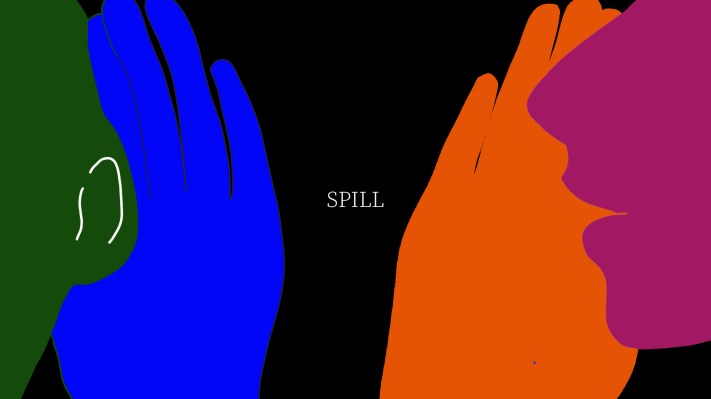Alphonzo “Phonz” Terrell and DeVaris Brown met during orientation on their first day working at Twitter. They didn’t know that just a few years later they’d be building a social media platform of their own.
“We were the only two Black guys in there, and we were like, ‘Hey, we’ll be friends!'” said Terrell, who served as the platform’s global head of Social & Editorial until last month, when he was one of thousands of employees laid off upon Elon Musk’s takeover. Brown was a product manager lead at Twitter working on machine learning, but left Twitter in 2020 to found Meroxa, a Series A startup that makes it easier for companies to build their data pipelines.
Today, Terrell and Brown are announcing waitlist signups for Spill, which they describe as “a real-time conversational platform that puts culture first.” They expect that the platform will launch in about six to eight weeks.
As Black creatives and technologists working in social media, Terrell and Brown have watched as Black women, queer people and other diverse communities have powered new trends on platforms like Twitter and TikTok, only to be overlooked. In the same way that Black founders are unfairly dismissed in venture capital, Black content creators have had their work stolen and earn fewer brand deals than white creators, studies have shown.
“I think this is really a platform issue,” Terrell told TechCrunch.”Even before I left Twitter, over the last several months, I was just talking to Black female creators, talking to Black queer creators and I’m like, ‘How do you make your money? Is any platform supporting you? Does the idea of Spill interest you?'”
So, it was important to the founders that Spill builds in creator monetization features from the get-go. Spill will use blockchain technology to chart how posts go viral and compensate the creators behind them, but Terrell deliberately refuses to call Spill a web3 company.
“It’s not a web3 thing,” Terrell told TechCrunch. “But the use of blockchain is for both crediting creators and setting up a model for us to compensate them automatically. If they have a spill that goes viral and we monetize it, it’s really effective.” Spill hasn’t decided yet what the revenue share will look like, or what method will be used to track how posts drive ad revenue, but Terrell says that creators will “absolutely get real cash” in U.S. dollars, not cryptocurrency. The blockchain technology is something that lives under the hood in the tech stack, not something that users will be bombarded with.
Like Twitter, Spill will have a live news feed where users can post “spills” (a step up from Mastodon‘s “toots“). They’re called “spill” after the phrase “spill the tea,” and Terrell said that they’re leaning into the teacup motif. Even their website sports a Kermit sipping tea meme (which, by the way, was popularized on Black Twitter). Spill is also building a feature called “tea parties,” where users can host both online and IRL events, then get in-app bonuses to apply to things like boosting their posts. Users can still buy boosted posts, but Terrell says that, “if you’ve been creating and crushing it on Spill, we’re going to give you these things.”
Brown, who is serving as Spill’s CTO, is extending the company’s commitment to honoring cultural production into the very fabric of the platform.
“This will probably be the first, from the ground up, large language content moderation model using AI that’s actually built by people from the culture,” Brown told TechCrunch.
There is an established history of racial biases within the hate speech detection algorithms that most social platforms use — one study showed that tweets written by African Americans were 1.5 times more likely to be flagged as offensive or hateful, while tweets written with AAVE (African American vernacular English) were 2.2 times as likely. AI can’t understand the cultural context in which certain speech is being used, especially if the developers behind the AI are people who don’t understand — and have made no attempt to understand — the linguistic nuances of cultures beyond their own. But if anyone can change that, maybe it’s Brown.
“We’re going to be more intentional and be more accurate around things that will be deemed offensive, because, again, this is our lived experience or learned experience,” he said. “It’ll be much more accurate to catch those kinds of things that will detract from the platform that would not lend to creating a safe space for our users and our creators.”
Spill is building with a small team — less than 10 people, plus three advisors, including Dantley Davis, Twitter’s former design chief. Other buzzy Twitter competitors like Hive have run into security issues when building these kinds of products without a robust team. But Spill’s founders are confident that they won’t fall into the same trap.
“You’ve got John McClane and MacGyver here!” said Brown. “Phonz, on the content and social side, has run some of the largest and most successful campaigns in the world.” At Twitter, Terrell’s team won a Webby Award for Best Overall Social Presence, and before that, he led social media marketing at HBO. “And then you have me, who literally has run some of the largest web scale services, probably since the advent and popularization of cloud computing. This isn’t our first rodeo.”
Spill’s waitlist is live now, where users can reserve their handle and receive updates before the platform’s launch.
Read more on TechCrunch:
- Week in Review: Twitter battles ElonJet, SBF arrested, OpenAI figures out watermarking
- ‘Black Adam’ arrives on HBO Max following box office bust
- Support King, banned by FTC, linked to new phone spying operation
- The rules of VC are changing: Here’s what founders should be considering in the new era
- Twitter suspends Mastodon’s account and bans links to Mastodon servers
